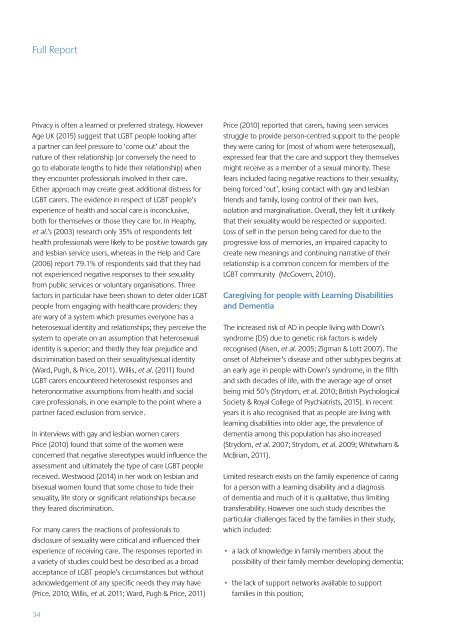The experiences needs and outcomes for carers of people with dementia
RSAS-ADS-Experiences-needs-outcomes-for-carers-of-people-with-dementia-Lit-review-2016
RSAS-ADS-Experiences-needs-outcomes-for-carers-of-people-with-dementia-Lit-review-2016
You also want an ePaper? Increase the reach of your titles
YUMPU automatically turns print PDFs into web optimized ePapers that Google loves.
Full Report<br />
Privacy is <strong>of</strong>ten a learned or preferred strategy. However<br />
Age UK (2015) suggest that LGBT <strong>people</strong> looking after<br />
a partner can feel pressure to ‘come out’ about the<br />
nature <strong>of</strong> their relationship (or conversely the need to<br />
go to elaborate lengths to hide their relationship) when<br />
they encounter pr<strong>of</strong>essionals involved in their care.<br />
Either approach may create great additional distress <strong>for</strong><br />
LGBT <strong>carers</strong>. <strong>The</strong> evidence in respect <strong>of</strong> LGBT <strong>people</strong>’s<br />
experience <strong>of</strong> health <strong>and</strong> social care is inconclusive,<br />
both <strong>for</strong> themselves or those they care <strong>for</strong>. In Heaphy,<br />
et al.’s (2003) research only 35% <strong>of</strong> respondents felt<br />
health pr<strong>of</strong>essionals were likely to be positive towards gay<br />
<strong>and</strong> lesbian service users, whereas in the Help <strong>and</strong> Care<br />
(2006) report 79.1% <strong>of</strong> respondents said that they had<br />
not experienced negative responses to their sexuality<br />
from public services or voluntary organisations. Three<br />
factors in particular have been shown to deter older LGBT<br />
<strong>people</strong> from engaging <strong>with</strong> healthcare providers: they<br />
are wary <strong>of</strong> a system which presumes everyone has a<br />
heterosexual identity <strong>and</strong> relationships; they perceive the<br />
system to operate on an assumption that heterosexual<br />
identity is superior; <strong>and</strong> thirdly they fear prejudice <strong>and</strong><br />
discrimination based on their sexuality/sexual identity<br />
(Ward, Pugh, & Price, 2011). Willis, et al. (2011) found<br />
LGBT <strong>carers</strong> encountered heterosexist responses <strong>and</strong><br />
heteronormative assumptions from health <strong>and</strong> social<br />
care pr<strong>of</strong>essionals, in one example to the point where a<br />
partner faced exclusion from service.<br />
In interviews <strong>with</strong> gay <strong>and</strong> lesbian women <strong>carers</strong><br />
Price (2010) found that some <strong>of</strong> the women were<br />
concerned that negative stereotypes would influence the<br />
assessment <strong>and</strong> ultimately the type <strong>of</strong> care LGBT <strong>people</strong><br />
received. Westwood (2014) in her work on lesbian <strong>and</strong><br />
bisexual women found that some chose to hide their<br />
sexuality, life story or significant relationships because<br />
they feared discrimination.<br />
For many <strong>carers</strong> the reactions <strong>of</strong> pr<strong>of</strong>essionals to<br />
disclosure <strong>of</strong> sexuality were critical <strong>and</strong> influenced their<br />
experience <strong>of</strong> receiving care. <strong>The</strong> responses reported in<br />
a variety <strong>of</strong> studies could best be described as a broad<br />
acceptance <strong>of</strong> LGBT <strong>people</strong>’s circumstances but <strong>with</strong>out<br />
acknowledgement <strong>of</strong> any specific <strong>needs</strong> they may have<br />
(Price, 2010; Willis, et al. 2011; Ward, Pugh & Price, 2011)<br />
Price (2010) reported that <strong>carers</strong>, having seen services<br />
struggle to provide person-centred support to the <strong>people</strong><br />
they were caring <strong>for</strong> (most <strong>of</strong> whom were heterosexual),<br />
expressed fear that the care <strong>and</strong> support they themselves<br />
might receive as a member <strong>of</strong> a sexual minority. <strong>The</strong>se<br />
fears included facing negative reactions to their sexuality,<br />
being <strong>for</strong>ced ‘out’, losing contact <strong>with</strong> gay <strong>and</strong> lesbian<br />
friends <strong>and</strong> family, losing control <strong>of</strong> their own lives,<br />
isolation <strong>and</strong> marginalisation. Overall, they felt it unlikely<br />
that their sexuality would be respected or supported.<br />
Loss <strong>of</strong> self in the person being cared <strong>for</strong> due to the<br />
progressive loss <strong>of</strong> memories, an impaired capacity to<br />
create new meanings <strong>and</strong> continuing narrative <strong>of</strong> their<br />
relationship is a common concern <strong>for</strong> members <strong>of</strong> the<br />
LGBT community (McGovern, 2010).<br />
Caregiving <strong>for</strong> <strong>people</strong> <strong>with</strong> Learning Disabilities<br />
<strong>and</strong> Dementia<br />
<strong>The</strong> increased risk <strong>of</strong> AD in <strong>people</strong> living <strong>with</strong> Down’s<br />
syndrome (DS) due to genetic risk factors is widely<br />
recognised (Aisen, et al. 2005; Zigman & Lott 2007). <strong>The</strong><br />
onset <strong>of</strong> Alzheimer’s disease <strong>and</strong> other subtypes begins at<br />
an early age in <strong>people</strong> <strong>with</strong> Down’s syndrome, in the fifth<br />
<strong>and</strong> sixth decades <strong>of</strong> life, <strong>with</strong> the average age <strong>of</strong> onset<br />
being mid 50’s (Strydom, et al. 2010; British Psychological<br />
Society & Royal College <strong>of</strong> Psychiatrists, 2015). In recent<br />
years it is also recognised that as <strong>people</strong> are living <strong>with</strong><br />
learning disabilities into older age, the prevalence <strong>of</strong><br />
<strong>dementia</strong> among this population has also increased<br />
(Strydom, et al. 2007; Strydom, et al. 2009; Whitwham &<br />
McBrian, 2011).<br />
Limited research exists on the family experience <strong>of</strong> caring<br />
<strong>for</strong> a person <strong>with</strong> a learning disability <strong>and</strong> a diagnosis<br />
<strong>of</strong> <strong>dementia</strong> <strong>and</strong> much <strong>of</strong> it is qualitative, thus limiting<br />
transferability. However one such study describes the<br />
particular challenges faced by the families in their study,<br />
which included:<br />
• a lack <strong>of</strong> knowledge in family members about the<br />
possibility <strong>of</strong> their family member developing <strong>dementia</strong>;<br />
• the lack <strong>of</strong> support networks available to support<br />
families in this position;<br />
34


